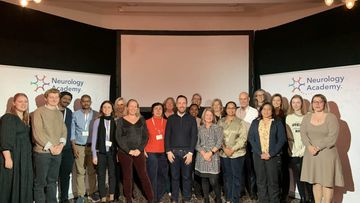Real people doing real things to make a difference to those with MS – Raising the bar for MS: Past, present… Future.
Healthcare professionals are often making little changes to services locally to try and improve outcomes for, or experiences of, the people with MS that they serve.
This has never been truer than during the past several months, as the coronavirus pandemic has monumentally shifted our healthcare system, our society, and the basic ways we have to interact with each other.
For 'Raising the Bar for MS: Past, present… Future' we would love to hear your examples for the 'not-necessarily-a-poster' submission… Examples of real people, doing real things to make a difference to those with MS.

- At home urinary tract infection kits
- Pre-and rehabilitative breathing techniques via video
- Virtual clinics - equalising the patient/professional relationship
- Self-management apps and joining up virtual services
- Microsite for people with MS to answer common questions and share information
In partnership with patients:
At home urinary tract infection kits
In Surrey Downs Health and Care, the MS nurses have instigated an at-home urine testing kit to monitor for urinary tract infections, which can be more common when on a DMT, and which, if undiagnosed early, can lead to hospitalisation. The testing kit comprises urine testing strips, a urine specimen pot, a sterile cup and a letter with information on how to carry out the test and what to do with it. There is also an accompanying video to help people fully understand the process.
Service evolution:
Virtual clinics - equalising the patient/professional relationship
MS specialist nurse Amy Harbour, whose community-based MS service covers around 150 miles of south east England, said clinics stopped when the team was redeployed at the start of the pandemic. They have now all been brought back online in the form of telephone or video appointments. Amy notes that appointments that would usually take half-an-hour face-to-face now take 10 to 15 minutes.
“I don’t know if that is because we’ve given people the chance to self-manage for a short period while we were redeployed and they have found the tools and techniques to do that, or whether they just feel a little bit more comfortable cutting the interview short if they want to."
Feedback from those with MS suggests that this is a positive change, one of feeling an equal in conversation with their healthcare professional and able to steer their appointments as needed.
→ Listen to Amy discuss their service on 19th June in webinar 'New service models'
Lifestyle or Service evolution:
Self-management apps and joining up virtual services
Dr Agne Straukiene and her team, like many others, were forced to reorganise services and embrace virtual consultants. Whilst it was 'challenging', Agne and her team launched a new app in March and found it had greater utility than they had first thought. MSConnect was developed as a patient-facing educational tool before the pandemic. However, the team has found that it can serve as a store of education classes, cognition support and has been a positive tool for self-management for many people in their area with MS. The app also includes links to Agne’s mindfulness and meditation podcast, #BEEWELLWITHMS.
Whilst being clear that there are people who require a more low-tech approach, and circumstances where face to face clinics are beneficial, Agne shares that
“Distance is no longer an issue if you employ the tech. By working together, no matter where your service is, we can support each other… This is the way forward.”
→ Listen to Agne on 6th July's webinar 'Neuro-rehabilitation – now and the future'
In partnership with patients or Lifestyle:
Pre-and rehabilitative breathing techniques via video
Neurophysiotherapist Jody Barber, who is passionate about the importance of breathing in managing both respiratory and mental health, has recorded and shared a number of videos on breathing techniques to support positive mental health, to promote strengthening of the respiratory system, and to aid recovery after a respiratory illness which might include COVID-19. The short accessible videos are patient-facing whilst being useful for other professionals to share with their own patients, or use to upskill themselves in breathing techniques.
→ Find Jody's videos, and more information on breathing techniques online.
In partnership with patients or Service evolution:
Microsite for people with MS to answer common questions and share information
Professor Gavin Giovannoni developed a microsite for people with MS when he realised how many questions people had - often the same ones - without anywhere to aim them. MSSelfie was established early in the coronavirus pandemic to 'collate information from the Barts-MS blog and to answer questions about COVID-19 in relation to multiple sclerosis and its treatments.'
Providing answers to people's questions can alleviate concern, help people to feel less anxious and to make informed decisions. The microsite has so far responded to over 20 COVID-19 related questions, many with additional comments and queries within the response pages. All the information is accessible to people with MS and professionals alike, and the function to ask new questions is easy to use.
Related articles
Encouraging excellence, developing leaders, inspiring change
MS Academy was established five years ago and in that time has accomplished a huge amount. The six different levels of specialist MS training are dedicated to case-based learning and practical application of cutting edge research. Home to national programme Raising the Bar and the fantastic workstream content it is producing, this is an exciting Academy to belong to.


